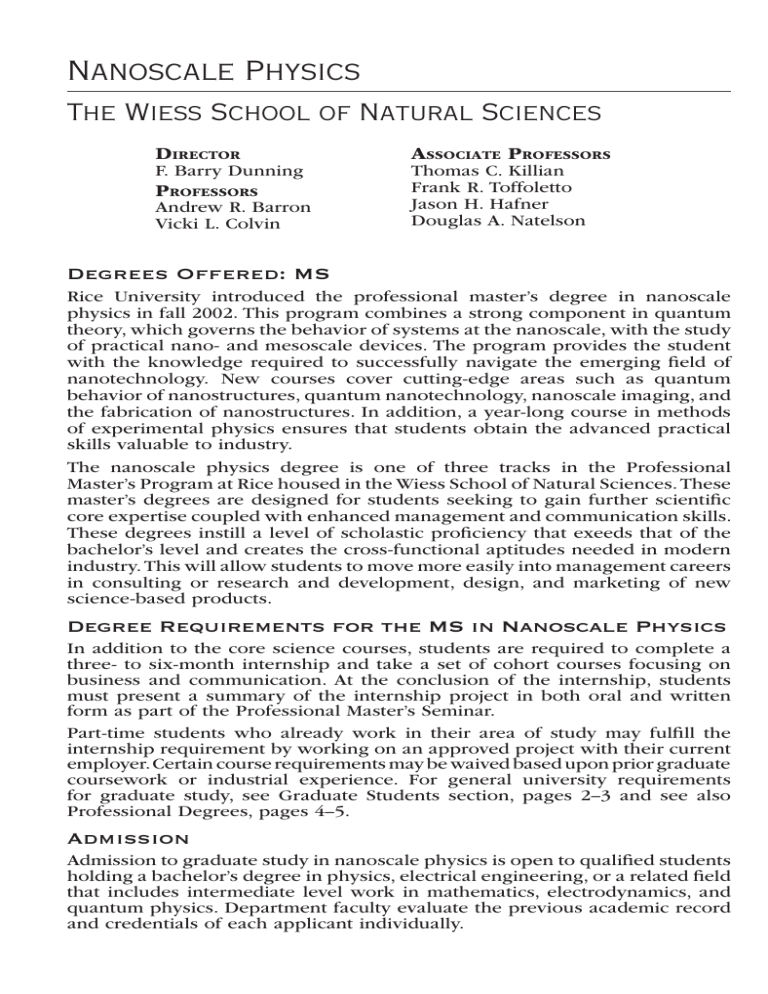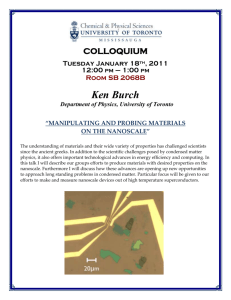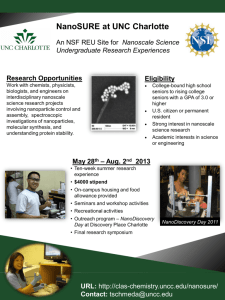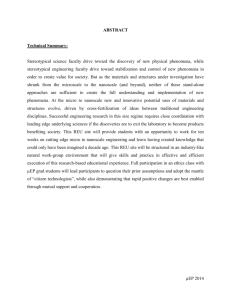Nanoscale Physics

Nanoscale Physics
The Wiess School of Natural Sciences
D irector
F. Barry Dunning
P rofessors
Andrew R. Barron
Vicki L. Colvin
A ssociAte
P rofessors
Thomas C. Killian
Frank R. Toffoletto
Jason H. Hafner
Douglas A. Natelson
Degrees Offered: MS
Rice University introduced the professional master’s degree in nanoscale physics in fall 2002. This program combines a strong component in quantum theory, which governs the behavior of systems at the nanoscale, with the study of practical nano- and mesoscale devices. The program provides the student with the knowledge required to successfully navigate the emerging field of nanotechnology. New courses cover cutting-edge areas such as quantum behavior of nanostructures, quantum nanotechnology, nanoscale imaging, and the fabrication of nanostructures. In addition, a year-long course in methods of experimental physics ensures that students obtain the advanced practical skills valuable to industry.
The nanoscale physics degree is one of three tracks in the Professional
Master’s Program at Rice housed in the Wiess School of Natural Sciences. These master’s degrees are designed for students seeking to gain further scientific core expertise coupled with enhanced management and communication skills.
These degrees instill a level of scholastic proficiency that exeeds that of the bachelor’s level and creates the cross-functional aptitudes needed in modern industry. This will allow students to move more easily into management careers in consulting or research and development, design, and marketing of new science-based products.
Degree Requirements for the MS in Nanoscale Physics
In addition to the core science courses, students are required to complete a three- to six-month internship and take a set of cohort courses focusing on business and communication. At the conclusion of the internship, students must present a summary of the internship project in both oral and written form as part of the Professional Master’s Seminar.
Part-time students who already work in their area of study may fulfill the internship requirement by working on an approved project with their current employer. Certain course requirements may be waived based upon prior graduate coursework or industrial experience. For general university requirements for graduate study, see Graduate Students section, pages 2–3 and see also
Professional Degrees, pages 4–5.
Admission
Admission to graduate study in nanoscale physics is open to qualified students holding a bachelor’s degree in physics, electrical engineering, or a related field that includes intermediate level work in mathematics, electrodynamics, and quantum physics. Department faculty evaluate the previous academic record and credentials of each applicant individually.
2 D epartments
/ Nanoscale Physics
Science core courses:
PHYS 533 Nanostructures and
Nanotechnology I
PHYS 539 Characterization and Fabrication at the Nanoscale
PHYS 537 Methods of Experimental Physics I
PHYS 534 Nanostructures and Nanotechnology II
PHYS 538 Methods of Experimental Physics II
PHYS 416 Computational Physics
Cohort courses:
NSCI 501 Professional Master’s Seminar
[required for 2 semesters]
NSCI 511 Science Policy and Ethics
NSCI 512 Professional Master’s Project
NSCI 610 Management in Science and
Engineering
Internship
An internship may be conducted under the guidance of a host company, government agency, or national laboratory. A summary of the internship project is required in both oral and written form as part of the Professional
Master’s Project.
Elective Courses
Note: Each of these electives is not offered every year, and some courses may have prerequisites or require instructor permission.
Students will choose four elective courses, two of which must be science or engineering 500 level or above. Recommended courses include, but are not limited to, the following:
BIOE 620 Tissue Engineering
CAAM 378 Introduction to Operations
Research
CEVE 322 Engineering Economics and
Management
CHEM 547 Supramolecular Chemistry
ELEC 521 High Performance Nanoscale
Systems
ELEC 568 Laser Spectroscopy
ELEC 571 Imaging at the Nanoscale
ELEC 573 Optical Spectroscopy of
Nanomaterials
ELEC 603 Nano-optics and Nano-photonics
ELEC 685 Fundamentals of Medical
Imaging
MGMT 661 International Business Law
MGMT 674 Production and Operations
Management
MGMT 676 Project Management/Project
Finance
MGMT 721 General Business Law
MSCI 535 Crystallography and Diffraction plus lab
MSCI 580 Microscopy Methods in Material
Science
MSCI 614 Special Topics: Principles of
Nanoscale Mechanics
MSCI 650 Nanomaterials and
Nanomechanics
PHYS 569 Ultrafast Optical Phenomena
Professional Science Master’s 5th Year Degree
Option for Rice Undergraduates
Rice students have an option to achieve the MS in nanoscale physics by adding an additional fifth year to the four undergraduate years of science studies.
Advanced Rice students in good standing apply during their junior year, then start taking required core courses of the nanoscale physics program during their senior year. A plan of study based on their particular focus area will need to be approved by the track director and the PSM director.




